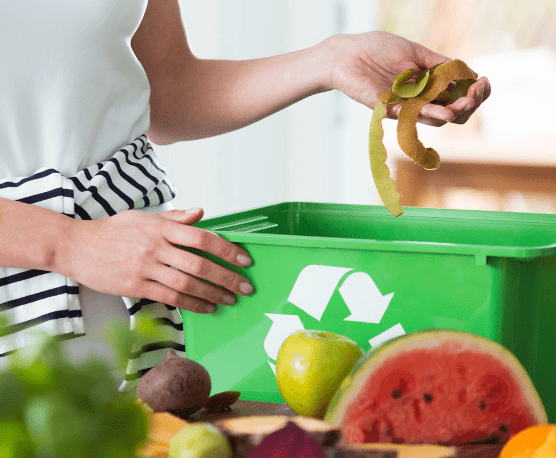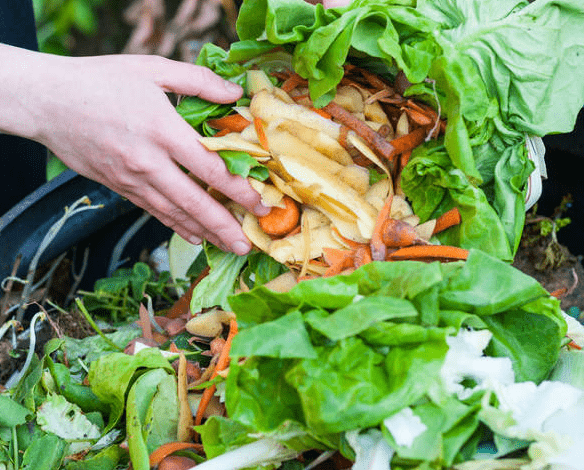Reducing Food Waste for Environmental & Community Benefit

Food waste is a significant problem around the world, with about one-third of all food produced globally being wasted each year. This waste contributes to greenhouse gas emissions, water waste, and land degradation. In the context of the environment, reducing food waste is a crucial step towards sustainability.
Understanding the Environmental Impact of Food Waste
The environmental impact of food waste begins at the production stage, where resources such as water, energy, and land are used to grow and cultivate crops. When food is wasted, all of these resources are also wasted, and the carbon footprint of the food is amplified. This means that food waste is not only a waste of resources, but it also contributes to climate change by increasing greenhouse gas emissions.
Food waste also has a significant impact on water resources. Agriculture is the largest consumer of water in the world, accounting for about 70% of global water use. When food is wasted, all of the water that went into producing it is also wasted. In regions with water scarcity, this is a significant problem that can have severe consequences for the environment and communities that rely on those resources.
Finally, food waste also contributes to land degradation. When food is discarded in landfills, it decomposes and releases methane gas. Methane is a potent greenhouse gas that is 25 times more effective at trapping heat than carbon dioxide. Methane emissions from landfills contribute to global warming and climate change, making food waste a significant contributor to environmental degradation.
The Impact of Food Waste on Communities
Reducing food waste is not only important for the environment but also for communities that rely on food resources. According to the Food and Agriculture Organization of the United Nations, 821 million people around the world suffer from chronic undernourishment. Reducing food waste could help address this issue by ensuring that food resources are used efficiently and effectively.
Food waste also has economic consequences for communities. In many developing countries, farmers and other food producers lack access to the infrastructure and resources needed to store and transport food effectively. This can result in significant food losses and lost income for farmers and producers.
In developed countries, food waste occurs primarily at the consumer level. Consumers throw away perfectly good food due to confusion about expiration dates, overbuying, and improper storage. This food waste has economic consequences for households, as well as environmental consequences.
The Alarming Statistics of Food Waste and Its Impact on Society and the Environment
According to a recent study, an estimated $27 billion worth of food, or 40% of what’s produced annually in Canada, is wasted between field and table. In 2011, the Food and Agricultural Organization of the United Nations estimated that 33% of global food production, or 1.3 billion tonnes, is wasted per year. Throwing away less food saves money, uses scarce resources more efficiently, and leaves more for the poor to eat. The environmental consequences of letting good food go to waste—up and down the food chain—are staggering. Food waste seems like an obvious issue that ought to unite everyone from environmentalists and social justice advocates to businesses and parsimonious consumers in common cause.
Blaming Poor Meal Planning and Leftover Avoidance
According to Gord Miller, Ontario’s environmental commissioner, poor meal planning, leftover avoidance, and increasing demand for aesthetically perfect food are the primary culprits of kitchen waste. The widespread obsession with flawless-looking produce and the convenience of takeout and fast food have only worsened this problem. Unfortunately, this has led to a culture of overconsumption and disregard for the resources that go into food production.
Practical Tips for Reducing Food Waste
Reducing food waste requires a concerted effort from all of us. Fortunately, there are many simple steps we can take to reduce our food waste and make a positive impact on the environment and communities.

- Plan Your Meals and Shop Wisely: One of the best ways to reduce food waste is by planning your meals ahead of time and only buying what you need. Make a grocery list before you go shopping and stick to it to avoid overbuying. Additionally, try to shop at stores that sell imperfect produce, which is just as nutritious as its perfect-looking counterparts but is often thrown away due to cosmetic imperfections.
- Store Your Food Properly: Proper storage is essential for keeping food fresh and preventing spoilage. Make sure to store food in airtight containers, and use your fridge and freezer to their full potential. Consider using a food vacuum sealer to extend the shelf life of perishable items.
- Use Leftovers: Leftovers are a great way to reduce food waste and save money. Make sure to store them properly and use them within a few days. Get creative with your leftovers by turning them into new meals or incorporating them into soups and stews.
- Compost: Composting is an excellent way to reduce food waste and create nutrient-rich soil for your garden. You can compost food scraps, yard waste and other organic materials. Check with your local government or waste management company to see if they offer composting services.
- Donate Excess Food: If you have excess food that you can’t use, consider donating it to a local food bank or shelter. Many organizations accept non-perishable and perishable food items, and it’s a great way to help those in need while reducing food waste.
Collaboration is crucial in reducing food waste for a sustainable future. Taking action at all stages of the food supply chain and implementing practical tips can make a significant impact on the environment and communities. Learn more about the harmful effects of air and water pollution and ways to mitigate these impacts in the article Environmental Impact of Natural Resource Extraction. It’s up to all of us to take steps towards sustainability and reducing our impact on the environment.
The Role of Businesses and Governments in Reducing Food Waste
Reducing food waste is not just the responsibility of individuals. Businesses and governments also have a significant role to play in reducing food waste and promoting sustainability.
Businesses can take steps to reduce food waste throughout the supply chain, from production and processing to distribution and sales. For example, food manufacturers can find innovative ways to use food waste, such as using vegetable scraps to make soup or turning excess produce into juice. Grocery stores can also take steps to reduce food waste by selling “ugly” produce at a discount, donating excess food to local charities, and implementing effective inventory management systems.
Governments can also play a significant role in reducing food waste. They can create policies and regulations that promote sustainability, such as providing incentives for businesses to reduce food waste, implementing food waste reduction targets, and supporting composting and other waste reduction initiatives. Additionally, governments can invest in infrastructure that supports sustainable agriculture, such as irrigation systems and renewable energy sources.
A Table of Food Waste Reduction Tips
To summarize the practical tips for reducing food waste, here is a table of actions individuals can take:
| Action | Description |
| Plan Your Meals | Plan meals ahead of time and only buy what you need. |
| Shop Wisely | Make a grocery list and stick to it to avoid overbuying. |
| Buy Imperfect Produce | Shop at stores that sell “ugly” produce. |
| Store Food Properly | Use airtight containers and the fridge/freezer to their full potential. |
| Use Leftovers | Store leftovers properly and get creative with repurposing them. |
| Compost | Compost food scraps and other organic materials. |
| Donate Excess Food | Donate excess food to local food banks or charities. |
Collaboration in Reducing Food Waste for a Sustainable Future
Reducing food waste is a crucial step towards creating a more sustainable future. By taking action at all stages of the food supply chain and implementing practical tips for reducing food waste, individuals, businesses, and governments can make a significant impact on the environment and communities. We must all work together to reduce food waste and promote sustainability for a better future.